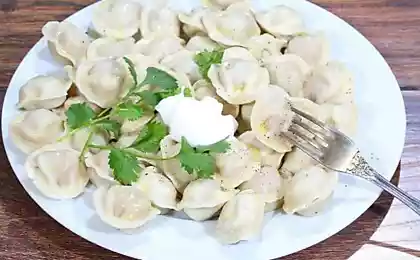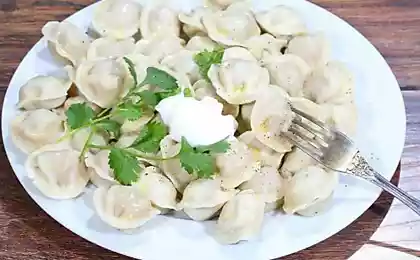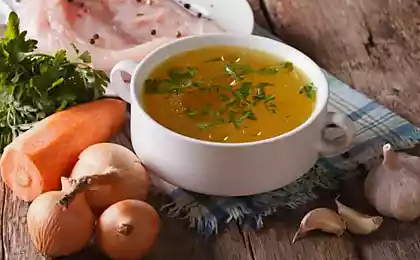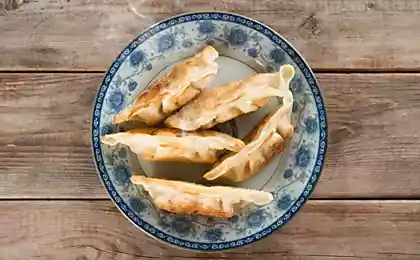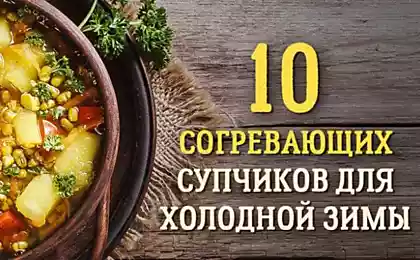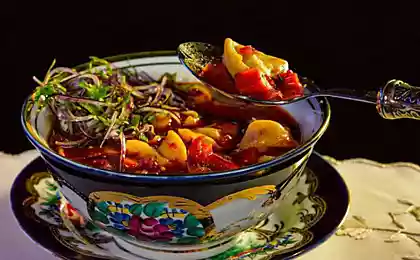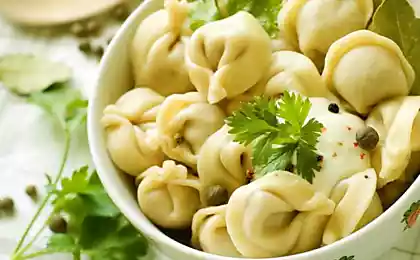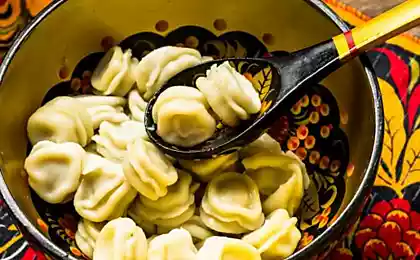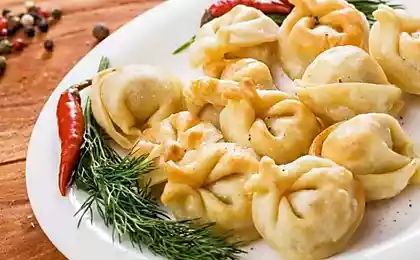2000
A variety of breakfast (26 photos)
I want to show you a few dishes cooked for breakfast, you may take for yourself something new and srisuete couple of recipes.
What's good in these breakfasts, so this is what they will be able to cook even an inexperienced cook.
Enjoy your meal.
By the way, you eat breakfast in the morning?
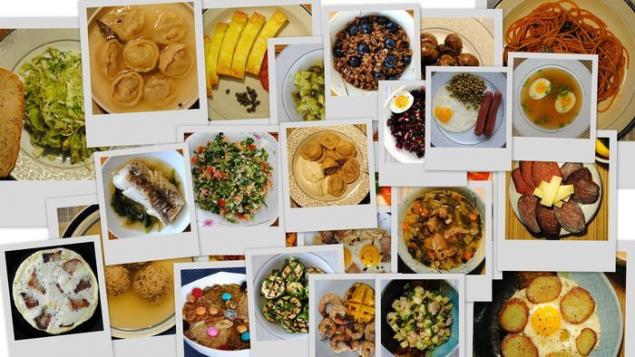
Fresh cabbage, green sour apple, dill, lemon juice, olive oil, salt.
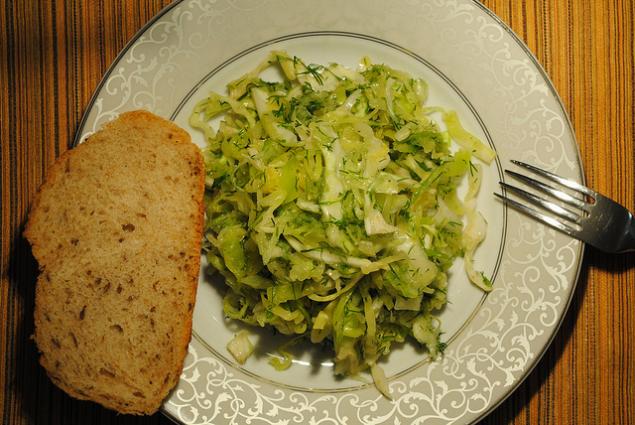
Boiled potatoes, melted butter, egg, salt and black pepper.
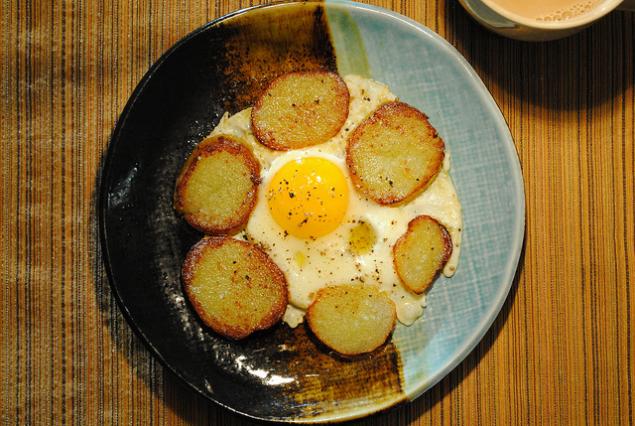
Although a large literature on the emergence of new "paste" is replete with references to Marco Polo's journey to China, the first documented mention of these products from wheat flour, water and eggs found in Persian literature of the 10th century. There is also a hypothesis that the ancient Greeks knew pasta as "Itria", but what it was, how to cook and how cooked (roasted) there is still no clear evidence. Persian paste called "lakhsha", meaning "slippery" - in everyday descriptions of those years, it describes how people sucked it into his mouth :) a hair's breadth, as today's kids in kindergarten. The word was used over 4 centuries, but in the 14th century almost completely disappeared from use. Since then, the Persians and the Arabs use the word "guinea worm". It's funny that before you completely disappear in the Middle East, the word lakhsha moved (after buyers of furs and Tatar-Mongols) in the territory occupied by the Soviet Union in the future. This north-Caucasian laksa, Ukrainian and Russian Lokshin noodles.
Pasta and tomato sauce (tomatoes, parsley, pungent green pepper, garlic, onion, olive oil, capers and salt).
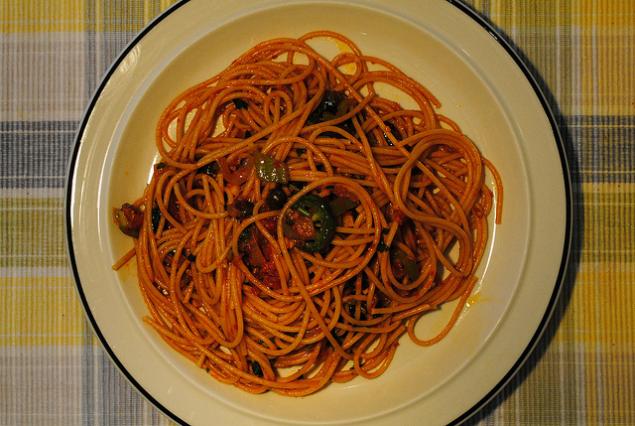
Chicken breasts are marinated overnight in an aqueous solution of salt, sugar, smoked red pepper, orange zest and oregano. Toasted in a skillet grill 3 minutes on each side.
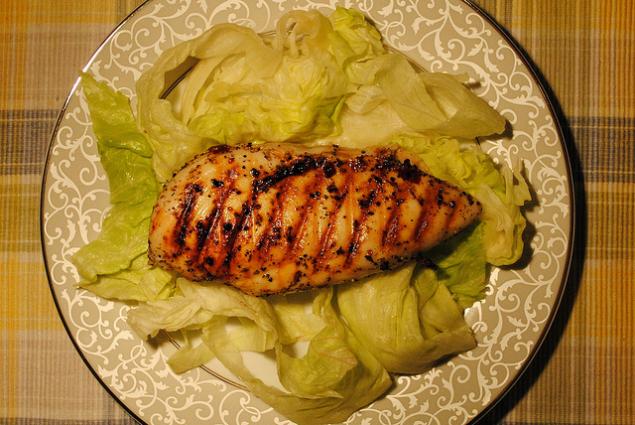
In the Trans-Baikal style.
Strong mutton broth from the refrigerator. Meatballs (?) Of ground beef + onions + pickles + capers + black pepper and salt. Since the boiling brew 5 minutes.
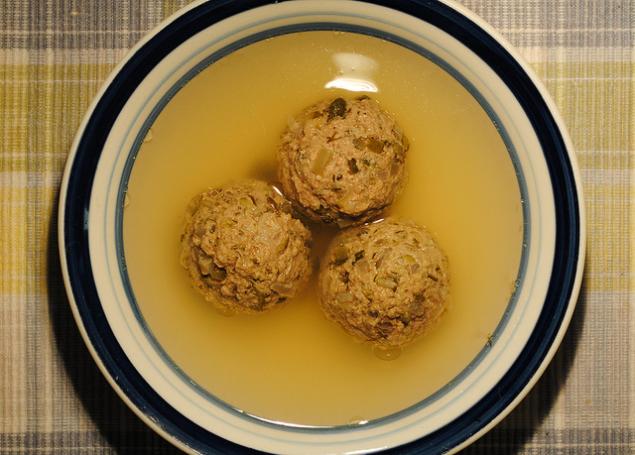
Tomatoes, cucumbers, moderately hot pepper, onion, lemon juice, capers, black pepper, coarse salt and olive oil.
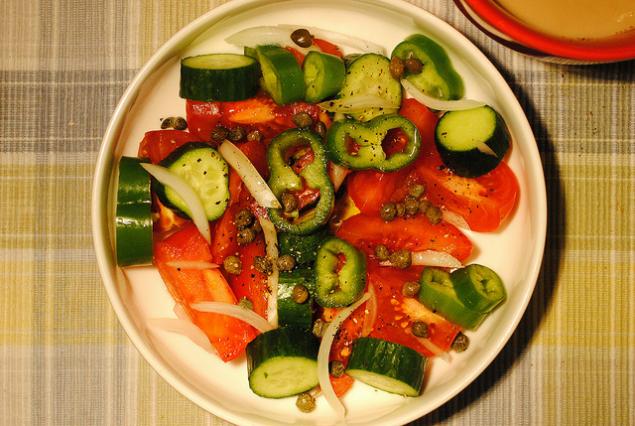
Breakfast weekend.
Mutton kidney roasted in olive oil. Onion, parsley, black pepper, lemon juice.
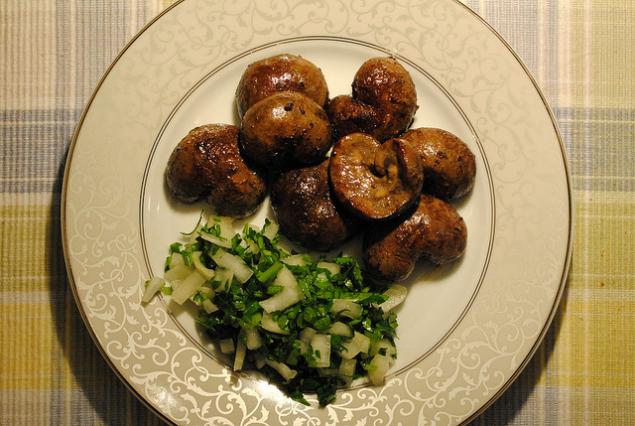
"The Soviet omelette" out of the oven (eggs, milk, salt), "grileny" tomato and capers.
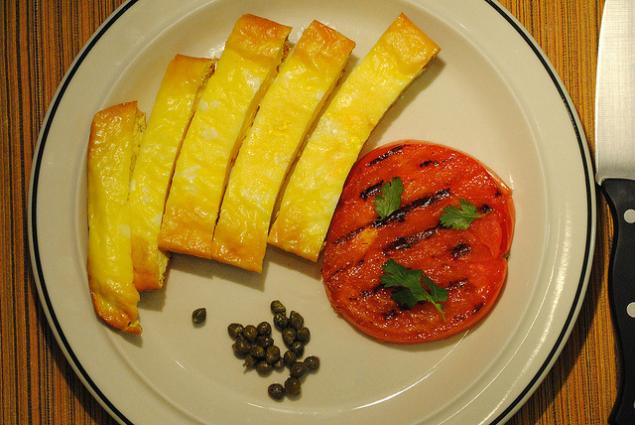
Persians brought the noodles in the modern world, but not only for that we love them ©. Let's also put aside plov (pilaf) and pay attention to the "stuffed pasta." A thousand years ago, the Iranians called it "Shesh-Bahrag" - "Shesh" - cooking; and "hut" - a piece. The combination of literary and words were strange to ordinary people - because you can not cook only pasta. Therefore, in folk etymology, sheshbarag quickly transformed into "Shush-barracks" - lamb's ear.
Scientists cmogli trace this word should follow the expansion of the influence of the Persians (and later the Arabs) to the north: dushbara in Azerbaijan tushbera in Tajikistan, Uzbekistan and chuchvara Chochur The Uighurs. Although the Uighurs and Chinese lived together, but they have not found a common language cooking - until the 17th century "mainland" China did not know about the bags from the test. According to one of the experts on the history of China, the Chinese met with them only in the 17-18 th century: there were two main areas - from Siberia (Mongolia), and "steam engines of Western civilization».
Sheshbarag, if you do not pay attention to the variations of the name, it is a crescent stuffed with meat, where the stuff is made with horns. This later became the characteristic shape in Tunisia called "hat Turks", and in Italy - cappelletti. Russian met with sheshbarag th due to Finno-Ugric peoples of the Urals and Western Siberia, in which the Persians were buying furs. Until the 20th century, and now, in remote Siberian villages, the "paste" called pelnyan. Pel - ear and naan - bread in Persian.
Recipe from the book of the 15th century: Make dough from flour and water, roll, put the meat and slapped, boil in the broth until tender.
Dumplings from the freezer. The dough - flour and water. Stuffing of several kinds of meat. Beef broth. Bay leaf, onion and black pepper (peas).
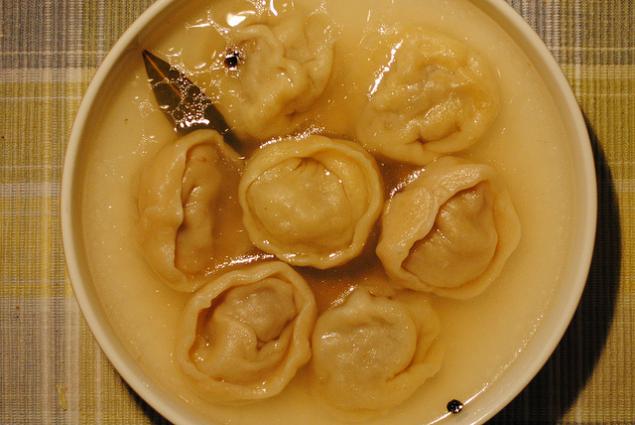
Soviet breakfast.
"Cutting" and sweet tea with lemon.
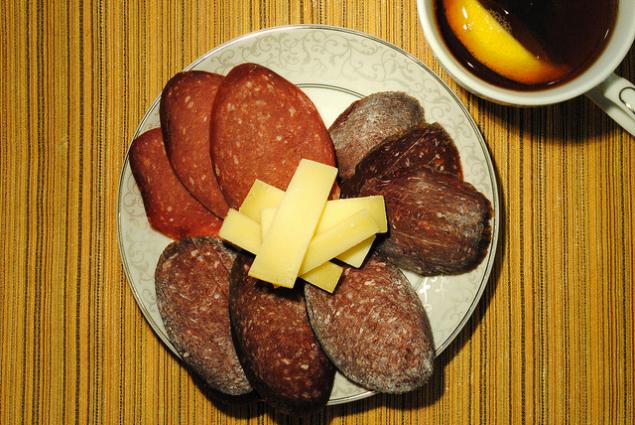
Potatoes cooked «in uniform», pickled (fermented) cucumber, dill, sunflower oil.
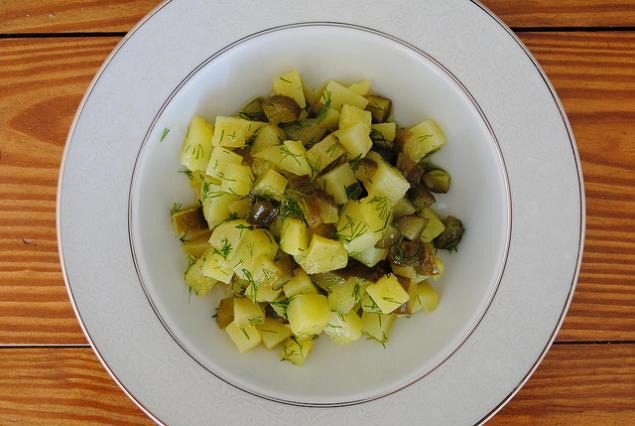
Christmas breakfast.
In Tunisia, a traditional and ceremonial dish in honor of the birthday of the Prophet Muhammad speaks Zgugu azide. Azide is something like a cream and Zgugu indicates that the main component of the sweet dishes are nuts Aleppo pine (Aleppo Pine, Pinus halepensis). This small tree grows throughout the Mediterranean - Spain, Italy, France, Greece, Tunisia, Syria, Lebanon, Izraylit ... Sometimes this is called the Jerusalem pine. Wood gives a small black nuts, sesame seed-sized. It is from these nut, after long and complicated procedures, Tunisians and prepare their Zgugu, and then decorate it with all sorts of patterns on top. The holiday is named muled, ie Christmas. And zgugu bit like Christmas sweets "Western world».
Without prescription.
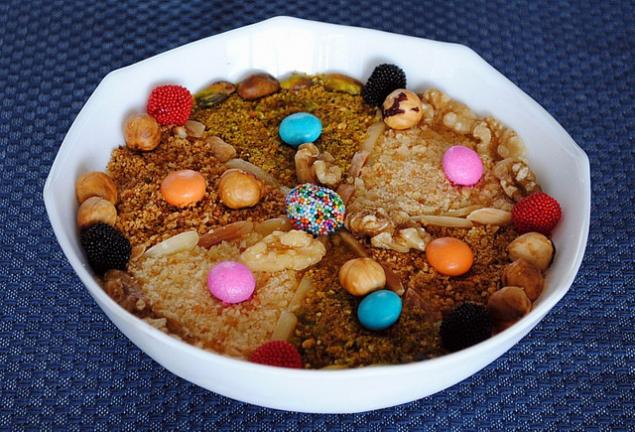
The oriental style.
Quinoa (quinoa), parsley, tomatoes, onions, hot green pepper, lemon juice, salt and olive oil.
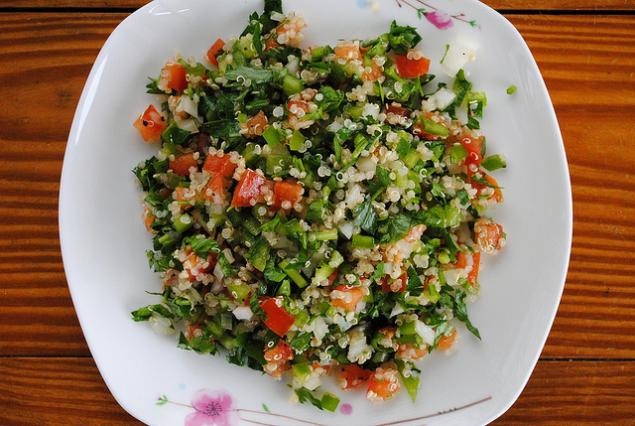
Country.
Bacon, onion, eggs, smoked red pepper.
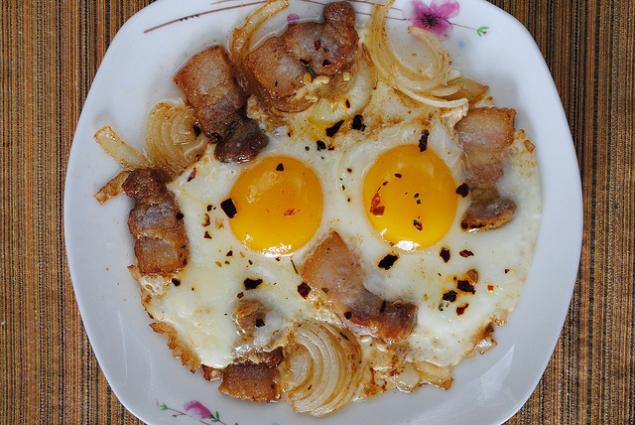
Stale bread, butter, eggs, milk, salt and cumin.
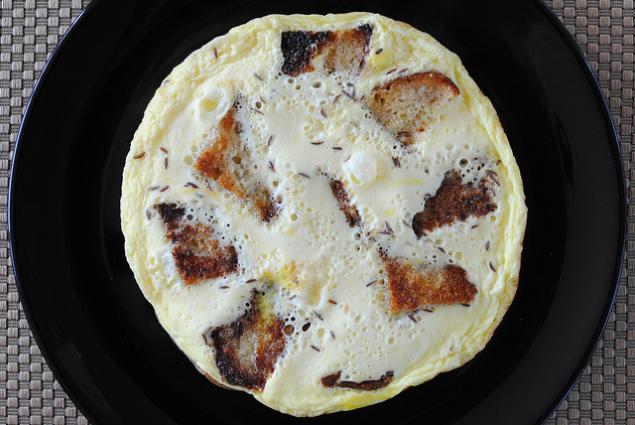
In most Islamic countries, called the word shorba soup. This is true for Iran, the Arab countries and Ethiopia. In Turkey and the Balkans is chorba. In Central Asia, there are such forms as shorpo, sorpa, shulpa, shurpa, while in Afghanistan and Pakistan is popular Shoreview. The word and its variations, going from the Persian language: Shore - salty, ba - cooking. This focus on the salinity of the water was not random. In the Middle Ages there was a whole class of different meat recipes, where the meat is first boiled to make it a little softer, and then roasted or baked. This tradition, for example, still remained in Afghanistan. Of course, the meat is boiled without salt. As we all know, if you cook the meat in salt water, you get a delicious broth, but the taste of the meat suffers. If you cook without salt, the meat will retain its full flavor, and the broth will be almost tasteless.
So is any shorba soup made in the fragrant broth. In the Russian language, especially in the central regions of Russia, it has become synonymous with the word impairing soup-stew of small fish.
Strong mutton broth from the refrigerator, chard, stemmed celery, carrots, coriander and salt.
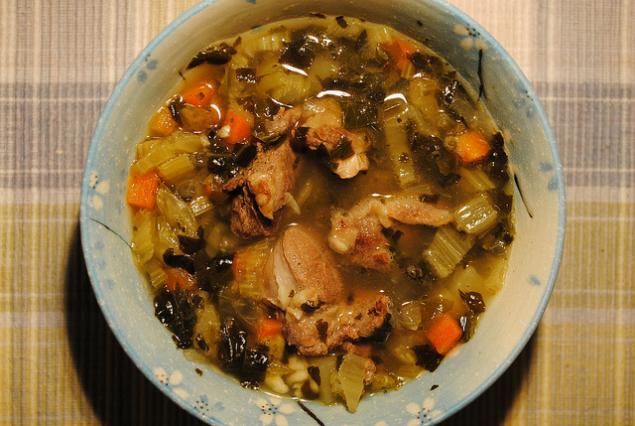
Fried zucchini (courgette), parsley, garlic, lemon juice, salt and olive oil.

Wheat worn out at night in a thermos with a wide neck. Butter and berries.

Fish fillets without skin, fennel, onions, 50 grams of water, salt and black pepper. Prepared under the hood 5 minutes after boiling.
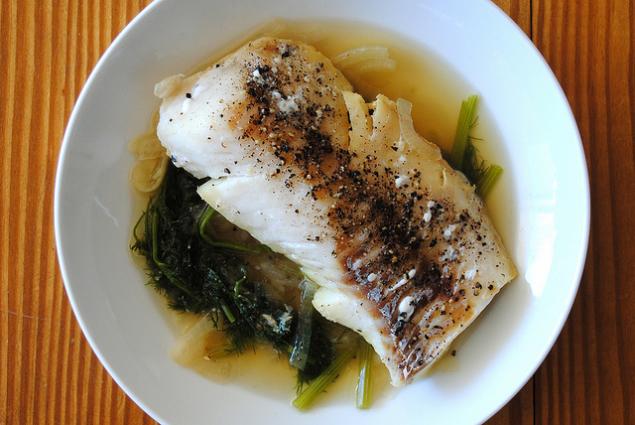
Breakfast weekend.
Mango, peeled shrimp with tail, butter, garlic, ginger, black pepper and salt.
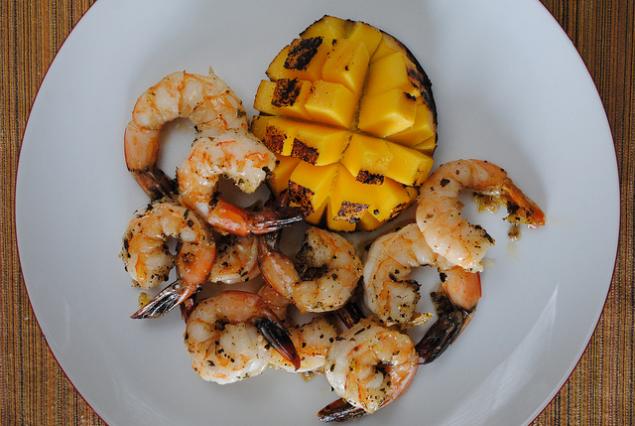
City.
Gray, I'll say right now tabi Cavo. Ec your mother, but you do not sheburshitsya. Well, it is not a magician ugamanittsa, well, nothing. It provokes me Nona girl from the city. Well I have tude davesya ezdeli office. By utryanke the emaciated I kavoto, and dumkayu: yushki pelnyanyami nada to drink, Ali choli. Tuk Cho you dumash it? Taperyacha there sits a new Cucuta. It looks Brava such a girl, but did not instruct it to me pelnyani yushkoy hotstsa. EYE hatched piles haylat its shameless and, after hovering mine. Does not reprove, ONET yushku drink it themselves, licholi. Duck it nikavo neznat urban ones, full of fools. Pogoryachilsi, Maleh. Yes, it has no desire to take a sin, and without vzagonoshil yushki, itit them there. Bravo though tea poshvyrkal manenko, it is winter. Milk Zabel, yeah.
Dumplings from the refrigerator. Dough: flour, eggs and water. Minced pork and onions. Boiled in water with the bay leaf.
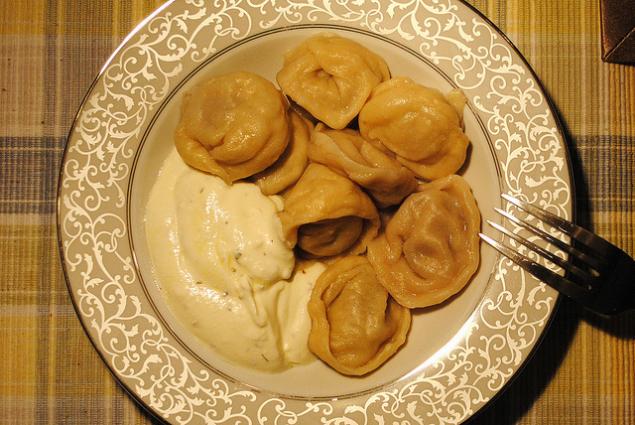
Red beef broth, egg and dill.

Potatoes cooked "in uniform", tuna canned in oil, olives, pitted, parsley, lemon juice, salt and olive oil.
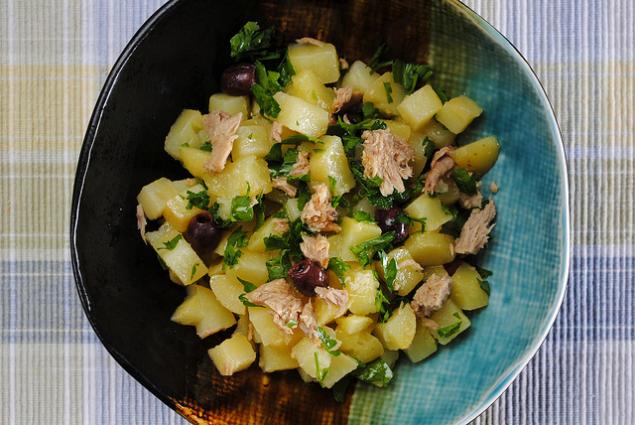
Roast beets, onions, parsley, capers, lemon peel, lemon juice, egg, black pepper, salt and olive oil.
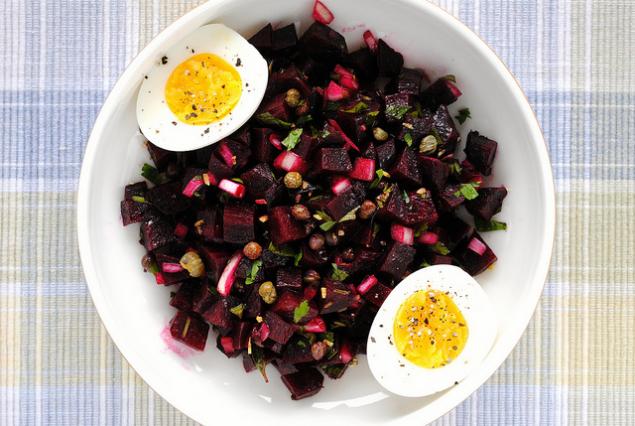
Classic breakfast.
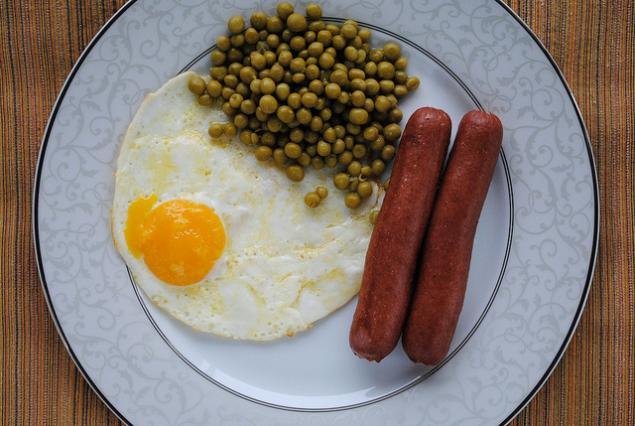
Source: stalic-kitchen.livejournal.com
What's good in these breakfasts, so this is what they will be able to cook even an inexperienced cook.
Enjoy your meal.
By the way, you eat breakfast in the morning?

Fresh cabbage, green sour apple, dill, lemon juice, olive oil, salt.

Boiled potatoes, melted butter, egg, salt and black pepper.

Although a large literature on the emergence of new "paste" is replete with references to Marco Polo's journey to China, the first documented mention of these products from wheat flour, water and eggs found in Persian literature of the 10th century. There is also a hypothesis that the ancient Greeks knew pasta as "Itria", but what it was, how to cook and how cooked (roasted) there is still no clear evidence. Persian paste called "lakhsha", meaning "slippery" - in everyday descriptions of those years, it describes how people sucked it into his mouth :) a hair's breadth, as today's kids in kindergarten. The word was used over 4 centuries, but in the 14th century almost completely disappeared from use. Since then, the Persians and the Arabs use the word "guinea worm". It's funny that before you completely disappear in the Middle East, the word lakhsha moved (after buyers of furs and Tatar-Mongols) in the territory occupied by the Soviet Union in the future. This north-Caucasian laksa, Ukrainian and Russian Lokshin noodles.
Pasta and tomato sauce (tomatoes, parsley, pungent green pepper, garlic, onion, olive oil, capers and salt).

Chicken breasts are marinated overnight in an aqueous solution of salt, sugar, smoked red pepper, orange zest and oregano. Toasted in a skillet grill 3 minutes on each side.

In the Trans-Baikal style.
Strong mutton broth from the refrigerator. Meatballs (?) Of ground beef + onions + pickles + capers + black pepper and salt. Since the boiling brew 5 minutes.

Tomatoes, cucumbers, moderately hot pepper, onion, lemon juice, capers, black pepper, coarse salt and olive oil.

Breakfast weekend.
Mutton kidney roasted in olive oil. Onion, parsley, black pepper, lemon juice.

"The Soviet omelette" out of the oven (eggs, milk, salt), "grileny" tomato and capers.

Persians brought the noodles in the modern world, but not only for that we love them ©. Let's also put aside plov (pilaf) and pay attention to the "stuffed pasta." A thousand years ago, the Iranians called it "Shesh-Bahrag" - "Shesh" - cooking; and "hut" - a piece. The combination of literary and words were strange to ordinary people - because you can not cook only pasta. Therefore, in folk etymology, sheshbarag quickly transformed into "Shush-barracks" - lamb's ear.
Scientists cmogli trace this word should follow the expansion of the influence of the Persians (and later the Arabs) to the north: dushbara in Azerbaijan tushbera in Tajikistan, Uzbekistan and chuchvara Chochur The Uighurs. Although the Uighurs and Chinese lived together, but they have not found a common language cooking - until the 17th century "mainland" China did not know about the bags from the test. According to one of the experts on the history of China, the Chinese met with them only in the 17-18 th century: there were two main areas - from Siberia (Mongolia), and "steam engines of Western civilization».
Sheshbarag, if you do not pay attention to the variations of the name, it is a crescent stuffed with meat, where the stuff is made with horns. This later became the characteristic shape in Tunisia called "hat Turks", and in Italy - cappelletti. Russian met with sheshbarag th due to Finno-Ugric peoples of the Urals and Western Siberia, in which the Persians were buying furs. Until the 20th century, and now, in remote Siberian villages, the "paste" called pelnyan. Pel - ear and naan - bread in Persian.
Recipe from the book of the 15th century: Make dough from flour and water, roll, put the meat and slapped, boil in the broth until tender.
Dumplings from the freezer. The dough - flour and water. Stuffing of several kinds of meat. Beef broth. Bay leaf, onion and black pepper (peas).

Soviet breakfast.
"Cutting" and sweet tea with lemon.

Potatoes cooked «in uniform», pickled (fermented) cucumber, dill, sunflower oil.

Christmas breakfast.
In Tunisia, a traditional and ceremonial dish in honor of the birthday of the Prophet Muhammad speaks Zgugu azide. Azide is something like a cream and Zgugu indicates that the main component of the sweet dishes are nuts Aleppo pine (Aleppo Pine, Pinus halepensis). This small tree grows throughout the Mediterranean - Spain, Italy, France, Greece, Tunisia, Syria, Lebanon, Izraylit ... Sometimes this is called the Jerusalem pine. Wood gives a small black nuts, sesame seed-sized. It is from these nut, after long and complicated procedures, Tunisians and prepare their Zgugu, and then decorate it with all sorts of patterns on top. The holiday is named muled, ie Christmas. And zgugu bit like Christmas sweets "Western world».
Without prescription.

The oriental style.
Quinoa (quinoa), parsley, tomatoes, onions, hot green pepper, lemon juice, salt and olive oil.

Country.
Bacon, onion, eggs, smoked red pepper.

Stale bread, butter, eggs, milk, salt and cumin.

In most Islamic countries, called the word shorba soup. This is true for Iran, the Arab countries and Ethiopia. In Turkey and the Balkans is chorba. In Central Asia, there are such forms as shorpo, sorpa, shulpa, shurpa, while in Afghanistan and Pakistan is popular Shoreview. The word and its variations, going from the Persian language: Shore - salty, ba - cooking. This focus on the salinity of the water was not random. In the Middle Ages there was a whole class of different meat recipes, where the meat is first boiled to make it a little softer, and then roasted or baked. This tradition, for example, still remained in Afghanistan. Of course, the meat is boiled without salt. As we all know, if you cook the meat in salt water, you get a delicious broth, but the taste of the meat suffers. If you cook without salt, the meat will retain its full flavor, and the broth will be almost tasteless.
So is any shorba soup made in the fragrant broth. In the Russian language, especially in the central regions of Russia, it has become synonymous with the word impairing soup-stew of small fish.
Strong mutton broth from the refrigerator, chard, stemmed celery, carrots, coriander and salt.

Fried zucchini (courgette), parsley, garlic, lemon juice, salt and olive oil.

Wheat worn out at night in a thermos with a wide neck. Butter and berries.

Fish fillets without skin, fennel, onions, 50 grams of water, salt and black pepper. Prepared under the hood 5 minutes after boiling.

Breakfast weekend.
Mango, peeled shrimp with tail, butter, garlic, ginger, black pepper and salt.

City.
Gray, I'll say right now tabi Cavo. Ec your mother, but you do not sheburshitsya. Well, it is not a magician ugamanittsa, well, nothing. It provokes me Nona girl from the city. Well I have tude davesya ezdeli office. By utryanke the emaciated I kavoto, and dumkayu: yushki pelnyanyami nada to drink, Ali choli. Tuk Cho you dumash it? Taperyacha there sits a new Cucuta. It looks Brava such a girl, but did not instruct it to me pelnyani yushkoy hotstsa. EYE hatched piles haylat its shameless and, after hovering mine. Does not reprove, ONET yushku drink it themselves, licholi. Duck it nikavo neznat urban ones, full of fools. Pogoryachilsi, Maleh. Yes, it has no desire to take a sin, and without vzagonoshil yushki, itit them there. Bravo though tea poshvyrkal manenko, it is winter. Milk Zabel, yeah.
Dumplings from the refrigerator. Dough: flour, eggs and water. Minced pork and onions. Boiled in water with the bay leaf.

Red beef broth, egg and dill.

Potatoes cooked "in uniform", tuna canned in oil, olives, pitted, parsley, lemon juice, salt and olive oil.

Roast beets, onions, parsley, capers, lemon peel, lemon juice, egg, black pepper, salt and olive oil.

Classic breakfast.

Source: stalic-kitchen.livejournal.com




